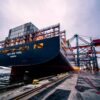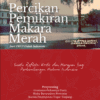The third amendment of the Indonesian Shipping Law (Law No. 17 of 2008 on Shipping) has brought changes to the role of the Indonesian Admiralty Court.
The recently issued, Law No. 66 of 2024, amends the Shipping Law quite extensively. The scope of changes includes fixation of tariffs, traditional cruises, maritime highways towards providing public freight services from and to remote islands, the enhancement of cabotage principles, ship arrest, and the expansion of the Admiralty Court’s authorities.
In Indonesia, the Admiralty Court is an institution that operates under the auspices of the Ministry of Transportation, apart from the Indonesian judiciary run by the Supreme Court. The Admiralty Court carries out correctional functions in relation to ship accidents.
The Addition of Subject to the Authority of the Admiralty Court
Before the amendment, carrying out further examination on ship accidents for the purpose of upholding seafarers’ professional code of conduct was the main role of the Admiralty Court. Hence, masters and officers of ships involved in ship accidents were the only subjects of the court’s authority.
In exercising its power, the Admiralty Court examines ship accident cases by assigning a panel of experts to conduct hearings and issue administrative sanctions if the implicated master and/or officer is found committing any misconduct or negligence in violation of the seafarers’ professional code of conduct.
Under the amended version of Shipping Law, ship owners and operators, as well as government officials who might also be involved or implicated in a ship accident, can be subject to further examination carried out by the Admiralty Court. Ship owners and operators who are proven at fault or negligent are subject to administrative sanction of admonition and suspension or revocation of business license, whilst government officials are subject to disciplinary sanction.
Mediation of Seafarer Employment Disputes
In addition to the above, the Admiralty Court has a new authority to mediate disputes arising from seafarer contracts.
Prior to the third amendment of Shipping Law, mediation of seafarer employment disputes was conducted pursuant to the rules of Law No. 2 of 2004 on Settlement of Industrial Relations Disputes. Under said law, employment disputes, in general, must be resolved firstly through bipartite meetings with the employer. If the bipartite meeting fails, the parties may refer their dispute to mediation at the relevant Manpower Agency.
In cases where the mediation is successful, the disputing parties shall enter into a mutual agreement to be further registered in the Industrial Relations Court. On the contrary, if the mediation fails, the mediator shall issue a recommendation in writing to be responded to by the parties, also in writing, whether to accept or reject it.
Accordingly, the Admiralty Court will take over the Manpower Agency’s role in mediating seafarer employment disputes unless regulated otherwise. For example, mediation of seafarer employment disputes related to fishing vessels is specifically regulated to be carried out under the authority of the Minister of Marine Affairs and Fisheries.
Aligning the Implementing Regulations
The Admiralty Court exercises its authority pursuant to the provisions of several implementing regulations. Such regulations govern the existence and operation of the Admiralty Court, which comprises:
- The Government Regulation No. 9 of 2019 on the Examination of Shipping Accidents.
- The Minister of Transportation Regulation No. PM 6 of 2020 on the Procedures of Examination of Shipping Accidents as amended by the Minister of Transportation Regulation PM No. 30 of 2022 on the 2nd Amendment of the Minister of Transportation No. PM 6 of 2020 on the Procedures of Examination of Shipping Accidents.
- The Minister of Transportation Regulation No. PM 3 of 2021 on the Organization and Working Administration of Admiralty Court.
As the role of the Admiralty Court has expanded, the relevant implementing regulations must also be amended to align with the new mandate.





